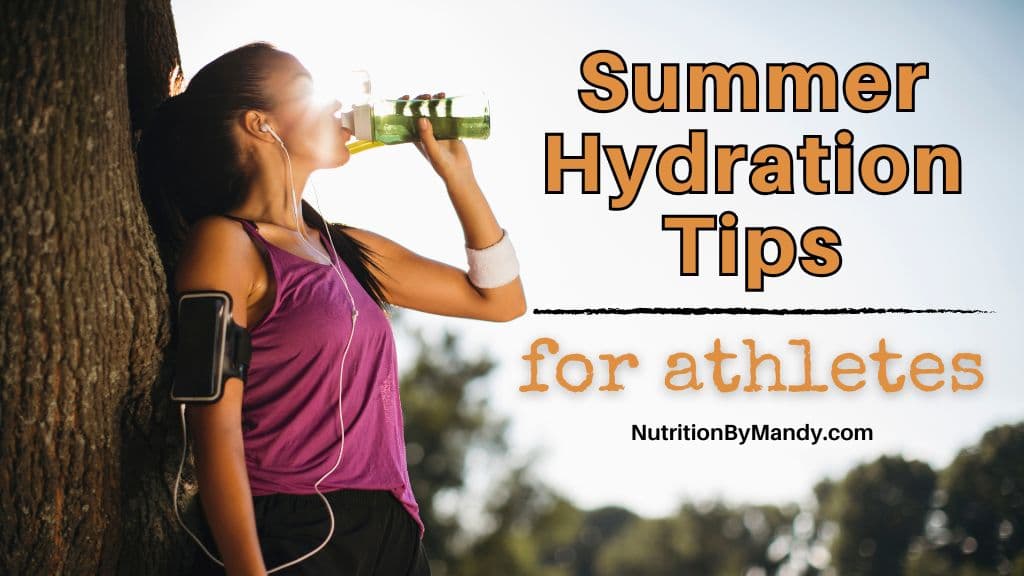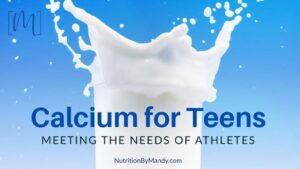Last Updated on April 23, 2025 by Mandy Tyler, M.Ed., RD, CSSD, LD
Beat the Heat: Summer Hydration Tips for Athletes
As we head into the summer months, it’s important for athletes to ensure they are staying on top of their hydration needs.
Let’s explore a variety of summer hydration tips designed to help athletes stay cool and perform at their best this summer.
Daily Summer Hydration Tips for Athletes
As the summer heat ramps up, staying hydrated should be a top priority for athletes. Hydration is essential for an athlete’s health as well as sports performance.
Below are simple strategies to support athletes with meeting their daily hydration needs.

Carry a Water Bottle with You
First, I recommend that athletes carry a refillable water bottle with them throughout the day.
When athletes are out and about, having a water bottle with them can serve as a reminder to hydrate. Having a water bottle handy also eliminates the need to stop and purchase a drink when thirsty.
I find athletes are more likely to stay on top of their hydration goals if they have a drink ready and available during the day.
Pro Tip: If athletes prefer flavored water, they can easily add a slice of cucumber or an orange wedge to their water bottle at the beginning of the day. As they refill their water bottle throughout the day the water will be enhanced with a refreshing flavor.
Drink Fluids with Meals and Snacks
Next, I encourage athletes to drink a healthy beverage with each meal and snack throughout the day. Hydrating with meals and snacks can help support athletes with meeting their hydration needs.
In addition to water, nutritious beverage choices for athletes include:
- Low-fat milk
- High-protein milk
- 100% fruit or vegetable juice
- Sparkling water

Enjoy Fruits and Veggies with a High-Water Content
Another simple way for athletes to stay on top of their hydration needs this summer is by including a variety of fruits and veggies that have a high-water content in their meal plan.
This is a great way to not only help athletes stay hydrated, but also to add vitamins, minerals, and antioxidants to their meal plan.
Some of my top choices for produce that has a high-water content include:
- Watermelon
- Cantaloupe
- Strawberries
- Oranges
- Grapefruit
- Lettuce
- Tomatoes
- Celery
- Cucumbers
Pro Tip: A fruit smoothie can be a great option for athletes to enjoy as a refreshing afternoon snack on a hot summer day.
Monitor Your Urine Color
A tool that athletes can use to help monitor their daily hydration status is by the color of their urine. Although this is not a perfect assessment, it does provide a relative gauge on daily hydration status (1).
Urine that is pale yellow in color tends to indicate an athlete is well hydrated. While urine that is a dark yellow/orange color may indicate that the athlete needs to hydrate.
I commonly tell athletes their urine should be the color of Crystal Light lemonade, not apple juice.
Be Aware of the Signs and Symptoms of Dehydration
As the summer temperatures rise, it is critical for athletes to be aware of the warning signs of dehydration. Athletes can lose substantial amounts of fluids and electrolytes through sweat when exercising in hot environments (2).
By educating athletes on the early warning signs of dehydration, they can take action and help prevent the development of heat illnesses.
Signs and symptoms of dehydration may include (1):
- Thirst
- Fatigue
- Flushed skin
- Headaches, lightheadedness, dizziness
- Chills or heat sensations
- GI cramps, nausea, vomiting
- Decreased performance

Summer Hydration Tips for Activity
In addition to daily hydration strategies, it is important that athletes are equipped with a plan for hydrating surrounding their summer workouts.
Although hydration needs vary amongst athletes, there are some general guidelines athletes can follow.
Hydrate Before Your Summer Workouts
Starting workouts in an optimally hydrated state is key for athletes. From a practical standpoint, I like to encourage athletes to drink ~16 oz (2 cups) of fluid with their pre-workout meal.
If an athlete consumes this several hours before their workout, they will have plenty of time to go to the restroom before the start of the activity.
Athletes can then continue hydrating with ~8 oz (1 cup) of water or a sports drink in the 30-60 minutes before the start of the workout.
Note: For those who like more precise numbers, it is recommended that athletes drink 5-7 mL of fluid per kg of body weight approximately 4 hours before their exercise session (2).
Hydrate During Your Summer Workouts
Given the differences between athletes in the amount of fluid and electrolytes they lose in sweat, it is best for athletes to have an individualized plan for hydrating during their summer workouts.
However, a general guide is for athletes to plan to drink ~3-8 ounces of fluid every 15-20 minutes (0.4-0.8 L per hour) of activity (2, 3).
Drinking a big gulp of water or sports drink is equivalent to approximately 1 ounce of fluid. Based on this, athletes can aim for several big gulps from their water bottle every 15-20 minutes of activity or as competition allows
Is Thirst a Good Indicator of Fluid Needs During Summer Workouts?
While thirst may be a satisfactory indicator for hydrating during the day, I do not recommend athletes rely on thirst for meeting their hydration needs during their summer workouts (1, 4).
During activity, feelings of thirst may be delayed. In addition, when using thirst as an indicator of how much to drink, athletes may not consume enough fluid to match their hydration needs.
Thus, it is best for athletes to have a plan in place for hydrating during summer workouts that matches their individual sweat rates and fluid needs.
Summer Hydration Tips: Rehydrate After Your Workouts
During the summer months, it is important for athletes to prioritize replacing the fluid and electrolytes lost in sweat during their workouts.
This is particularly important when athletes are participating in two-a-day workouts and have limited time to recover between exercise sessions.
If an athlete does not replace the fluid lost during an exercise session, they will start the next workout or competition in a dehydrated state (2). Cumulative dehydration can increase an athlete’s risk of developing a heat illness and negatively impact sports performance (5).

How Much Fluid Should I Drink After a Workout?
Weighing before and after activity can help athletes determine how much fluid was lost in sweat. For each pound of weight lost during the activity, athletes should aim to drink 20-24 oz of fluid (3).
For example, if an athlete loses 2 pounds of weight during the workout, the athletes should aim to drink 40-48 oz of fluid (5-6 cups) in order to fully rehydrate before the next exercise session.
Don’t Forget About Electrolytes
When athletes sweat, they lose both fluids and electrolytes. The main electrolyte that athletes lose in sweat is sodium.
Thus, when athletes are considering their hydration needs, it is important to consider both fluid and electrolytes (sodium).
What About Sports Drinks to Hydrate During the Summer?
Hydrating with a sports drink during summer workouts may be of benefit to athletes. Sports drinks are formulated to contain fluid, carbohydrates, and electrolytes.
Consuming a sports drink during activity can help athletes replace the fluid and electrolytes lost in sweat. In addition, hydrating with a sports drink that contains carbohydrates will provide athletes with an additional source of energy for the workout.
Sports drinks are commonly recommended to athletes when (2, 6):
- The athlete will be working out for > 1 hour;
- The athlete has multiple workouts or competitions within the same day;
- The athlete has a morning workout and did not fuel prior to the exercise session;
- When it is hot and humid outside.
Thus, I do typically suggest that athletes consider a sports drink when doing prolonged workouts in the summer heat.
Summer Hydration Tips: Replacing Electrolytes Following Activity
Consuming sodium, in either food or beverages, after a workout will help athletes with replacing the sodium lost in sweat. In addition, the sodium will help athletes to better retain the fluid consumed after exercise (2).
Ideas for “salty foods” that athletes can add to their post-workout snacks and meals to support their recovery nutrition needs include:
- Pretzels, pita chips, snack crackers
- Salted nuts, jerky
- Deli meat, cheese
- Cottage cheese
- Pickles, relish, olives
- Broth-based soups
- Vegetable juice
- Sports and electrolyte drinks
Note: Athletes who have been advised to restrict their sodium or fluid intake should consult with a sports dietitian nutritionist on meeting their hydration needs surrounding activity.

Additional Tips for Exercising in the Heat this Summer
In addition to hydration, below are a few tips and reminders to share with athletes as they gear up for summer workouts (4, 6).
- When possible, schedule your workouts during the morning or the evening. It is best to avoid exercising during the hottest part of the day, especially for intense exercise sessions.
- Wear lose fitting, light-colored clothes during your workout sessions to help your body stay cool while exercising.
- Take precautions to help protect your skin from the sun’s UV rays – wear sunscreen, a hat, and sunglasses.
- Consider taking longer rest breaks during your workouts to allow time to rehydrate and cool down.
- Avoid exercising in the heat when you are sick or recovering from an illness. This is particularly important when recovering from a GI illness in which your hydration status may be compromised.
Beat the Heat: Summer Hydration Tips for Athletes
You are now set with a variety of hydration tips to support athletes with staying on top of their hydration needs this summer. Make sure to share these tips with your athletes and sports teams.
For additional sports nutrition tips, make sure to check out my blog with offseason nutrition strategies for athletes.
Join the Nutrition By Mandy Email List & Get a Free Weekly Meal Planner Template
Click HERE to join the Nutrition By Mandy e-mail list. When you join you will receive a free weekly meal planner template to download and plan out your meals for the week.
About the Author
Mandy Tyler is a Sports Dietitian Nutritionist in the San Antonio, TX area. She is a Registered and Licensed Dietitian, a Board-Certified Specialist in Sports Dietetics, a Licensed Athletic Trainer, and is a Certified Exercise Physiologist through the American College of Sports Medicine. Mandy has experience working with athletes at the high school, collegiate, and professional levels. She believes the key to reaching one’s full potential, both in everyday life and in sports performance, relies on a healthy nutritional foundation.

If you are looking to take your performance to the next level, make sure to check out my new Sports Nutrition Game Day Guide. This downloadable guide is written to help athletes develop an individualized plan to achieve peak performance on game day.





